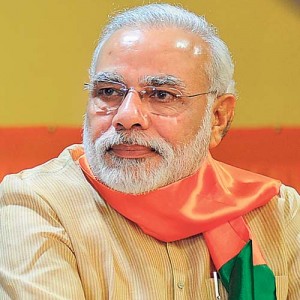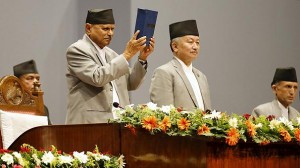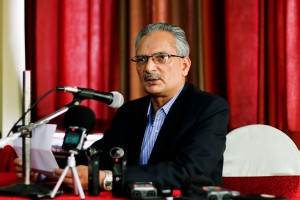Triangle of India, Nepal and its new constitution

India, periodically termed the largest democracy in the world, and expected widely to be the possible future economic powerhouse, has acquired yet another Himalayan headache this year.
The Modi manifestation of building confidence and relations in the region has possibly slipped negative as India tries pushing its personal agenda in Nepal. The visible agenda for India at this critical point in Nepal was expressing dissatisfaction for not adequately addressing the regional demands yet politics behind the walls was to punish Nepal because its leaders did not consult India while drafting new constitution.
Loosing regional allies
While Modi travels across the world, with hype and attention, his actions back at home has not earned him reputation. His first action to invite neighbours at his PM inauguration had symbolically sent message that Indian character to undermine its regional allies would gradually fade out. But not. He failed to build confidence in Pakistan, warmth in Maldives and neighbourliness in Sri Lanka.
Virtually, Bhutan is the only ally it has in the region and relation with Bangladesh remains unstrained for last few years. China from the north is making headway in pulling India’s neighbours into its confidence.
Public and intellectual reactions to the high handedness of Indian hegemony in the region projects the regional allies will face the most notorious treatment in case India rise to world’s economic power.
Possibly because of this reason, the neighbours would not be very happy to help India improve its economy and enhance its political dominance.
Nepal and its constitution
There aren’t any reasons for India to instruct Nepal in promulgating constitution. It was drafted and adopted by a democratically elected constitution through majority vote. By virtue of being a largest democracy, India’s reputed place would have been to welcome the process and its success.

Obviously, as a neighbour it has concerns for growing insecurity in Nepal borders, though it hasn’t grown to the extent of 2007 or that of during the Maoists insurgency.
India’s special envoy on the eve of constitution promulgation in Nepal was essentially an excuse to heighten the political turmoil in Nepal. It very well knows, any negative statement against Nepal’s decision would trigger instability in Terai Nepal. While it has expressed its concern for security situation in the region, it has added fuel to further worsen the situation.
Had India had any security concerns because of growing political instability, it would have positively strengthened capacity of the major political parties in Nepal resolve the issue and end the conflict. Instead, it promoted instability and insecurity, which signals, India does not necessarily needs peace and stability in Nepal, especially in southern districts.
Nepalese efforts
India in the past had categorically used Prachanda and his party to promote chaos and political instability thereby creating space to play. And it continued similar space from him this time around. While drafting the final version of the constitution, Prachanda openly ignored India’s interests and suggestions. Even for not having political gain for his party, Prachanda showed his statesmanship in last hours of the constitution making process. Had he not initiated, Nepal’s constitution-dream was impossible.
But he also largely failed to accommodate the Terai -based parties into this confidence. He had led allies with them for several months and had the capacity to drive them into the Constituent Assembly hall had he tried enough, adequate.
Dr Baburam Bhattarai had publicly presented him the difficulties country would face if Terai-based parties were not accommodated into the process. But he ignored, possibly to hasten the promulgation process or to undermine their presence in the national politics.

Bhattarai’s departure and future
As expected, Bhattarai divorced with Prachanda ending his three-decade long relationship. Bhattarai, a long time advocate of regional and ethnic politics, has plunged from national to regional politics.
Saying so, we must not undermine his role in bringing in Prachanda and his party to the peace process, constituent assembly and writing a new constitution. There are adequate reasons for us to say, Bhattarai was the real architect behind making a constitution through a constituent assembly of people’s representatives. He advocated for a constitution made by people’s representatives even while Prachanda utterly rejected. He always remained second in party but every time prevailed in major political discourse.
I would say, Bhattarai was not happy for not giving him comfortable level of credit in making this constitution. Prachanda rejected many of his proposals in last hours. And Bhattarai did not shine in the process.
Bhattarai has left party without his supporters and expressed commitment to serve the nation in personal capacity. His has expressed his support to protests in Terai and regional parties have invited him to be their leader.
This mean he could play a vital role in bringing the conflict into logical conclusion if his intentions are really to serve the nation and its people. His new agenda for creating a new power in post-constitution-making-phase would bear its relevance and receive public acceptance if he demonstrated leadership in ending conflict in Terai and open doors for peaceful development.